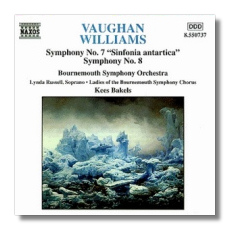
The Internet's Premier Classical Music Source
Related Links
- Vaughan Williams Reviews
- Latest Reviews
- More Reviews
-
By Composer
-
Collections
DVD & Blu-ray
Books
Concert Reviews
Articles/Interviews
Software
Audio
Search Amazon
Recommended Links
Site News
 CD Review
CD Review
Ralph Vaughan Williams

Last Symphonies
- Symphony #7 "Sinfonia antarctica" (1952)
- Symphony #8 in D minor (1956)
Movement commentary spoken by David Timson
Bournemouth Symphony Orchestra/Kees Bakels
Naxos 8.550737
According to Dante's Inferno* the last ring of hell is a field of ice encasing the worst of sinners, the traitors. In the middle is Satan, encased in ice up to his torso, eating the souls of Judas, Brutus and Cassius. To me, this is the essence of the" Sinfonia antartica". Anything less than that misses the whole point.
This is particularly the case in the opening movement. The cover picture on this particular CD reinforces that image in "Glacial Sea" by François-August Biard. This is certainly how I picture hell. This idea is reinforced by the composer when he alludes to the picture of Satan first painted in his musical composition, "Job". Of all the recordings I have heard, this one by Bakels captures the heart of this music better than any. Slatkin is a pale picture, as if touring hell in a motor coach and viewing everything from a window. Handley on EMI had been my favorite, but this Naxos recording is making me see the music anew. The performance is deeper, the recording is excellent, with a wonderful soundstage and detail. I have not heard the recent Andrew Davis recording, but have been disappointed with his cycle with the exception of Symphony #6.
The second movement is the only thing approaching lightness in this world. Even there, however, absurdity and chaos abound. There is a chill in the air in even this warmest of the five movements.
The rest of the symphony brings us back, again, to the final ring of hell. The organ contribution to proceedings is wonderful. It never overwhelms the orchestra, underlining where necessary, adding to the sense of other worldliness. Throughout the sense of awe in the face of death is pervasive.
Some say the world will end in fire, others ice. I fear the latter is the case. This symphony is not one I listen to often, but you can understand.
For what it is worth, Naxos includes the spoken dialogue the composer appended. This follows the Eighth Symphony. You can program the dialogue if you wish, frankly I always have found it a distraction. I mean, yeah, Prometheus is the allusion to the first movement, and he is a traitor of sorts, but I find the connection more distracting than helpful.
The opening of the Eighth is so soft as to mislead you into thinking that perhaps this is a continuation of the Seventh Symphony. At least in this recording that is the case. In the composer's own commentary, the first movement is "seven variations in search of a theme." Listening to this, I wonder if that is possibly a reference to the previous symphonies? There are moments in the first movement where I detect references to the 7th. I can't say that I detect other references, but I am not as familiar with those as I am these two coupled ones.
Now, let me get to the point. This is the finest recent recording I know of the Eighth Symphony. It is far superior to Slatkin's. On the other hand, I have the live performance of another English musician to compare it with, Leopold Stokowski. [BBC Radio Classics: IMP, Carlton Classics 15656 91312. I am trying to get all possible sources, my copy is about 4 years old and I am not sure how available it may be.] If you don't know, because he spent so much time in this country, Stokowski was born in London, England. (Not Persia or any of the other sources he might have come up with at one time or another;-) The Stokowski performance has more passion, more sweep, more music. (You know, I really would like to hear a recording by the dedicatte, Sir John Barbirolli. If any reader can help me, drop me a line.) The sound on the Stokowski recording is very good stereo from a broadcast source. The sound on the Naxos is better. So, the bottom line is get both recordings. You won't find a better" Sinfonia antartica" than this Naxos release and you really must hear the Stokowski; it is something special.
You know, one of the joys of writing reviews is the occasion it offers to revisit old friends like the Stokowski recording.
* Dante's Inferno translated by Robert Pinsky (1994)
Copyright © 1998, Robert Stumpf II


















